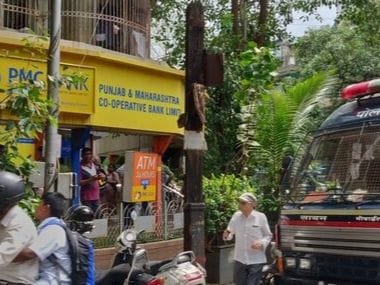An ugly political spin is being given to the RBI clampdown on Mumbai-based Punjab and Maharashtra Co-operative (PMC) ba nk. At this point, customers cannot withdraw more than Rs 1,000 from their deposits in the bank. Congress party leader, Priyanka Gandhi Vadra has hit at the Narendra Modi government for the RBI restrictions imposed on the bank citing the government’s wrong economic policies as a reason.
ये सिसकियाँ पंजाब & महाराष्ट्र सहकारी बैंक की खाताधारक एक महिला की हैं।आम लोग परेशान हैं क्योंकि वो RBI के एक औचक आदेश के चलते अपना पैसा बैंक से निकाल नहीं पा रहे।
— Priyanka Gandhi Vadra (@priyankagandhi) September 25, 2019
गलती सरकार की आर्थिक नीतियों की है। गलती शीर्ष अधिकारियों की है। लेकिन गाज निर्दोष और मेहनती लोगों पर गिर रही है। pic.twitter.com/4gqG0gQi1b
Politicising this issue is the last thing the situation demands at this point. The PMC episode is only the symptom of a deeper malaise plaguing many other loosely regulated cooperative banks in the country. These will pop up one by one if the RBI does not act fast. If one looks at the issue objectively, the central government has nothing to do with the collapse of cooperative banks. The real reasons are loose regulation and monitoring of these banks by the Reserve Bank and the involvement of local politicians in the running of these institutions. Many such banks have been either shut down or amalgamated forcefully with healthier banks since 2010 post-a NABARD review of cooperative banks. This process is still underway. The allegations on PMC bank, which has 137 branches, Rs 11,600 crore deposits and operations across six states, include financial irregularities and dubious exposure to certain large corporates. These are issues that come under the purview of the banking regulator, not the ruling government. The question that arises is, why did the RBI not identify the issue earlier and why did it wait till the last minute to clamp down on the bank stopping short of cancelling its licence. [caption id=“attachment_7400291” align=“alignleft” width=“380”]  Representational image. News18[/caption] Banking institutions—big or small–are guardians of public money. The mismanagement at the PMC Bank did not take place overnight. The RBI could have acted earlier without triggering a crisis which has now led to panicky customers, some of whom have parked their life’s savings in the bank. The PMC episode should make the RBI wake up to the precarious state of the cooperative banking sector. The central bank should come out with a comprehensive roadmap to reform these entities. According to data from NABARD, there are 33 state cooperative banks, 363 district central cooperative banks in the country as on 31 March 2018. The number of primary agricultural credit societies (PACS) as on 31 March 2017, stood at 95,595, as per the latest data available. State cooperative banks across the country have deposits to the tune of Rs 1,23,534 crore as on 31 March 2018 as against Rs 1,22,039 crore as on 31 March 2017. These lenders have a total loan outstanding of Rs 1,31,934 crore as on 31 March 2018 with an impressive loan recovery percentage of almost 95 percent. Of the total, 32 state cooperative banks posted a profit of Rs 1,037 crore during 2017-18 as against Rs 970 crore by 31 state cooperative banks during 2017-18. The non-performing assets (NPAs) stood at 4.72 percent of their total loans as on 31 March 2018 as compared to 4.10 percent as on 31 March 2017. The accumulated losses of these banks decreased to Rs 605 crore as on 31 March 2017 from Rs 527 crore as on 31 March 2018. At present, in most cooperative banks, RBI audit takes place once in 12 months whereas in commercial banks, there is stricter scrutiny. Instances like the PMC Bank episode shows us why the same set of regulations and regulatory scrutiny should be applied to large cooperative banks as well. The point is, large cooperative banks have similar scope of activities as commercial banks. They accept public deposits and give loans to all types of borrowers including corporates. Over the years, these banks were allowed to grow in size and expand their operations to new geographies. But the regulatory process didn’t evolve simultaneously. Compared with commercial banks, these entities are loosely regulated. Even NABARD, the agency that engages with cooperative banks, doesn’t often have updated information on this banking sector. This kind of opaqueness in operations results in unmonitored transactions that come under the regulatory lens too late. The RBI can begin with classifying systemically important cooperative banks based on their asset size, deposit operations and linkages to rest of the financial system in a similar manner commercial banks have been classified to systemically important commercial banks. These banks can be asked to adhere to the guidelines at par with commercial banks. Politicising cooperative mess, such as Vadra’s accusation on the Modi government for the PMC mess, is mere political opportunism; the fact is that the RBI was in a deep slumber and woke up to the problem too late.


)

)
)
)
)
)
)
)
)



